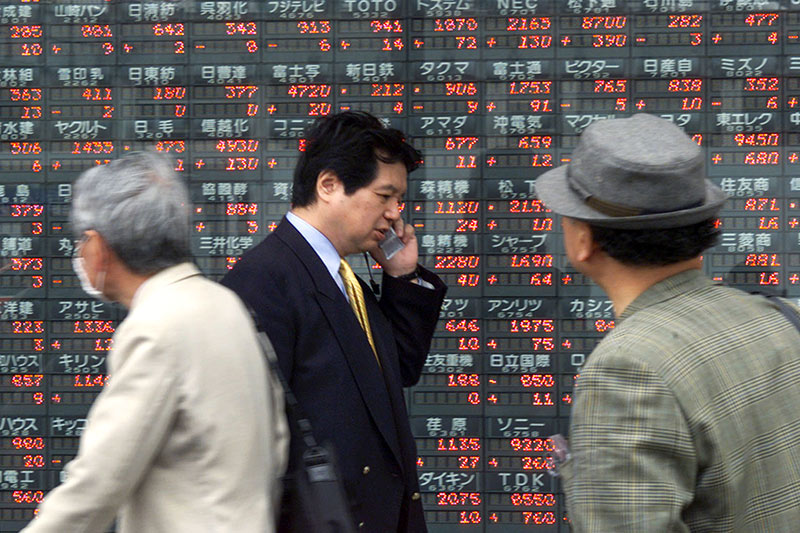Investing.com - Asian shares were broadly higher Monday as Chinese shares lead the rally and the Japanese yen fell to its lowest levels against the U.S. dollar since 2010.
In Asian trading Monday, Hong Kong’s Hang Seng soared 0.68% while the Shanghai Composite climbed nearly 2.1%. Japanese financial markets were closed due to a public holiday.
After falling 1.5% last week, the Shanghai Composite rebounded sharply as pharmaceuticals and technology names lead the rally.
Last week, data showed Chinese exports grew 14.1% from a year earlier in December, blowing past expectations for a 5% gain and up from a 2.9% increase in November.
Imports expanded by 6% from a year earlier, beating expectations for a 3.5% increase and following on from zero growth the previous month.
Ahead of Bank of Japan Governor Masaaki Shirakawa’s speech later today, the yen sank to its lowest levels since 2010 after Prime Minister Shinzo Abe said he is looking for a "bold policy leader" to replace Shirakawa whose term ends in April.
Elsewhere, Australian's benchmark S&P/ASX 200 added 0.3% even after a disappointing data report. The number of new home loans granted in Australia fell unexpectedly last month, official data showed on Monday.
In a report, Australian Bureau of Statistics said that Australian home loans fell to a seasonally adjusted -0.5%, from 0.1% in the preceding month. Analysts had expected Australian home loans to rise 0.3% last month.
Traders will no doubt be focusing on comments expected later today from Federal Reserve Chairman Ben Bernanke on monetary policy and a slew of important fourth-quarter earnings reports from major U.S. firms. Included on the earnings docket in the U.S. this week is nearly every major bank based there and those earnings announcements could renew or hamper risk appetite.
Meanwhile, New Zealand’s NZSE 50 climbed 0.48% while South Korea’s Kospi added 0.18%. Singapore’s Straits Times Index was one of the region’s laggards, trading lower by 0.45%.
In Asian trading Monday, Hong Kong’s Hang Seng soared 0.68% while the Shanghai Composite climbed nearly 2.1%. Japanese financial markets were closed due to a public holiday.
After falling 1.5% last week, the Shanghai Composite rebounded sharply as pharmaceuticals and technology names lead the rally.
Last week, data showed Chinese exports grew 14.1% from a year earlier in December, blowing past expectations for a 5% gain and up from a 2.9% increase in November.
Imports expanded by 6% from a year earlier, beating expectations for a 3.5% increase and following on from zero growth the previous month.
Ahead of Bank of Japan Governor Masaaki Shirakawa’s speech later today, the yen sank to its lowest levels since 2010 after Prime Minister Shinzo Abe said he is looking for a "bold policy leader" to replace Shirakawa whose term ends in April.
Elsewhere, Australian's benchmark S&P/ASX 200 added 0.3% even after a disappointing data report. The number of new home loans granted in Australia fell unexpectedly last month, official data showed on Monday.
In a report, Australian Bureau of Statistics said that Australian home loans fell to a seasonally adjusted -0.5%, from 0.1% in the preceding month. Analysts had expected Australian home loans to rise 0.3% last month.
Traders will no doubt be focusing on comments expected later today from Federal Reserve Chairman Ben Bernanke on monetary policy and a slew of important fourth-quarter earnings reports from major U.S. firms. Included on the earnings docket in the U.S. this week is nearly every major bank based there and those earnings announcements could renew or hamper risk appetite.
Meanwhile, New Zealand’s NZSE 50 climbed 0.48% while South Korea’s Kospi added 0.18%. Singapore’s Straits Times Index was one of the region’s laggards, trading lower by 0.45%.
